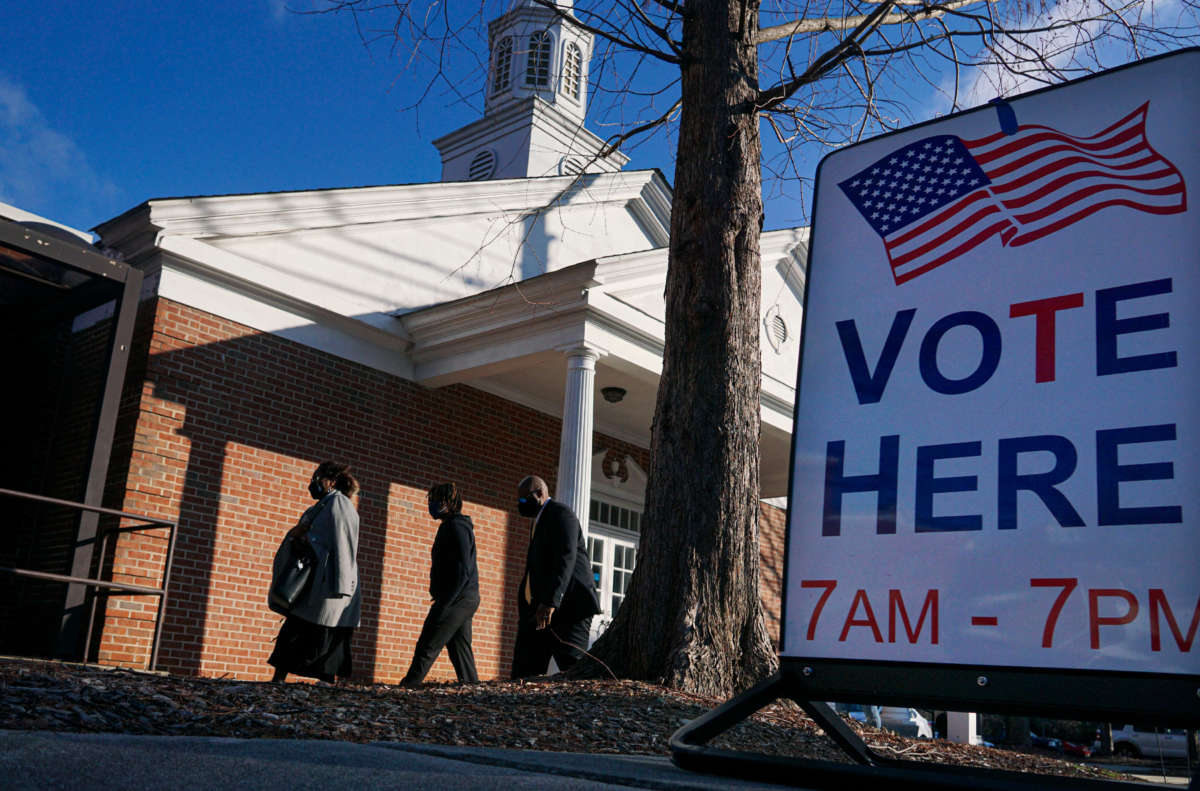Georgia Republicans’ SB 202 used to be a two-page document preventing third party groups from sending absentee ballots to people who have already received one. On Wednesday, Republicans ballooned the bill into a 93-page omnibus including many voter suppressing, wish list items from other bills.
The Republicans introduced the bill only one hour before the House’s Special Committee on Election Integrity meeting, giving legislators and voting rights groups very little time to review the bill. Republican State Rep. Barry Fleming introduced 50 new sections to SB 202, including previously considered provisions like adding additional ID requirements for voting absentee, limiting early voting windows, and outlawing passing out food and water to people standing in line to vote.
The additions also included some new proposals, aimed mostly at making it harder to vote — notably, one proposal would make it so that Georgians can file an unlimited number of challenges to “the qualifications of any person applying to register to vote” in the same county or municipality. The bill then requires the board of registrars to set a hearing on a challenge within 10 days after serving notice to the person whose voting “qualifications” are being challenged.
Attached to the beginning of SB 202 is now a preamble explaining Republicans’ apparent stated motivations behind introducing the bills to “comprehensively revise elections and voting.” The new proposals “are designed to address the lack of elector confidence in the election system on all sides of the political spectrum, to reduce the burden on election officials, and to streamline the process of conducting elections in Georgia by promoting uniformity in voting,” the Republicans write.
Voting rights advocates in the state were outraged by the last-minute changes. During a press conference, Andrea Young, the executive director of the American Civil Liberties Union of Georgia, called it “disgraceful” and characterized the sweeping voting rights bills as “ambushes.” “This is not evidence-based policy making,” she said, “this is not how laws should be made that govern our most precious right that is our right to vote.”
“GA Republicans are doubling down on undermining our democracy,” wrote Fair Fight Action on Twitter. “Surprising advocates, legislators, and voters with a nearly 100 page bill is undemocratic and unacceptable. The committee must REJECT the substitute to SB 202 and this shameless and dangerous attempt to restrict voting rights and rush through harmful anti-voting proposals.”
Former Georgia State Rep. Stacey Abrams, a voting rights advocate who founded Fair Fight Action, called the Republican attacks on voting rights “Jim Crow in a suit and tie” earlier this week.
Many of the Republicans’ voting proposals currently pending in Georgia are almost explicitly racist, targeting Black peoples’ right to vote in particular. One proposal that was among those added to SB 202 on Wednesday would limit early voting on weekends in larger, Democratic-leaning counties in the state. In fact, the proposal takes particular issue with the fact that weekend voting was offered at all during the 2020 election in metropolitan areas.
“More than 100 counties have never offered voting on Sunday, while many metro Atlanta counties did so in 2020,” the bill reads. “As a result, standardized advance voting hours means a dramatic increase in voting hours for some counties with slight decreases in other counties.” Voting on Sunday seems to be a particular grievance for Republicans targeting early voting in Georgia — early voting on Sundays is a huge driver of Black voter turnout thanks to “souls to the polls” drives organized by Black churches.
“This omnibus voter suppression bill combines nearly every tactic to disenfranchise Black voters that we’ve seen to date,” wrote Janai Nelson, associate director of the NAACP Legal Defense and Educational Fund, on Twitter. “Advocates received only 1 hour’s notice before the hearing. This is a hijacking of democracy in plain sight.”
The new proposal to add voter eligibility challenges also has racist connotations. About half of the 50 states allow voter challenges currently, and the Brennan Center for Justice notes that it’s a law that’s not only susceptible to abuse, but it’s also susceptible to abuse against people of color, students and people with disabilities in particular.
“Challenger laws were historically enacted and used to suppress newly enfranchised groups, like African Americans and women. Many states originally enacted challenger laws to block marginalized voters’ access to the polls,” Nicolas Riley of the Brennan Center wrote.
The Brennan Center has also previously found that the voting restrictions proposed in the state will affect Black voters the most. “Voter suppression is always unacceptable, and the razor thin political margins in Georgia may mean that suppression efforts like these will change political outcomes,” wrote Kevin Morris of the Brennan Center earlier this month. Republicans more likely than not are looking to push those margins in their favor.
Press freedom is under attack
As Trump cracks down on political speech, independent media is increasingly necessary.
Truthout produces reporting you won’t see in the mainstream: journalism from the frontlines of global conflict, interviews with grassroots movement leaders, high-quality legal analysis and more.
Our work is possible thanks to reader support. Help Truthout catalyze change and social justice — make a tax-deductible monthly or one-time donation today.
